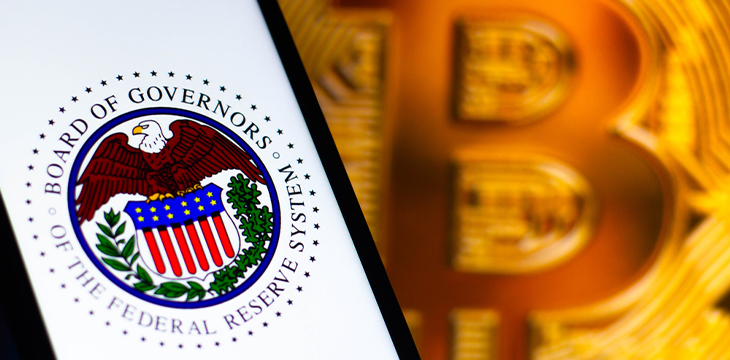|
Getting your Trinity Audio player ready...
|
The U.S. Federal Reserve has warned one of America’s last remaining ‘crypto’-friendly banks to improve its digital asset compliance or face the consequences.
On August 8, the Federal Reserve Board announced the execution of an enforcement action against Customers Bancorp of West Reading, Pennsylvania and Customers Bank of Malvern, Pennsylvania. Customers Bancorp is the parent company of Customers Bank, which offers a “blockchain-based 24/7/365 digital payment solution” known as CBIT (Customers Bank Instant Token).
Customers’ numerous crypto partners include exchanges such as Coinbase (NASDAQ: COIN), Gemini and Kraken, stablecoin issuers Circle and Paxos Trust, digital asset custodians Anchorage Digital and BitGo, and many more.
Similar 24/7 settlement networks were formerly offered by California’s Silvergate Bank and New York’s Signature Bank, both of which collapsed not long after the November 2022 implosion of Sam Bankman-Fried’s FTX exchange.
At the time of their respective collapses, Signature was under federal investigation for suspected money laundering by its ‘crypto’ clients, while Silvergate was flagged by federal prosecutors for failing to conduct adequate due diligence on its SBF-related clients.
The written agreement between Customers and the Fed states that inspections and examinations conducted by the Federal Reserve Bank of Philadelphia had “identified significant deficiencies related to the Bank’s risk management practices and compliance” with anti-money laundering (AML) rules, the Bank Secrecy Act (BSA) and regulations issued by the Treasury Department’s Office of Foreign Assets Control (OFAC).
The agreement requires Customers to submit a written plan detailing how it will alleviate the Fed’s concerns, including actions designed to “improve the Bank’s condition and maintain effective control over, and supervision of, the Bank’s major operations and activities, including its digital asset strategy.”
The ‘risk management’ section of the agreement singles out Customers’ digital asset strategy as requiring significant upgrades. In addition to enhancing its policies, Customers will also have to ensure that the individuals/groups tasked with overseeing its digital asset strategy “possess the appropriate subject matter expertise, stature, independence, and authority; have clearly defined roles and responsibilities; and are allocated adequate resources and staffing.”
The improvements will apply to both existing and future digital asset clients, as well as partners, products, programs, services and business lines. Bottom line, the Fed wants to know that Customers “has adequate controls in place to conduct its dollar token activities in a safe and sound manner.”
Putting the ‘do’ in due diligence
In terms of its BSA/AML compliance program, Customers is being asked to improve its “customer due diligence, beneficial ownership, and suspicious activity monitoring and reporting.”
As for that customer due diligence, Customers has been given 60 days to submit a revised program that the Fed must find acceptable, including enhanced screening of new customers and a plan “to remediate deficient due diligence for existing customers.” Clients will also be assigned risk ratings to identify those “who pose a heightened risk of conducting potentially illicit activities.”
Transaction monitoring will also need to step up, while Customers must engage a Fed-approved “independent third party” to review transaction monitoring activity from March 1, 2023, to August 31, 2023.
The beginning of that period roughly coincides with the Silvergate/Signature failures, and the Fed agreement says the review is intended to determine “whether suspicious activity involving high-risk customer or transactions at, by or though the Bank was properly identified and reported.”
OFAC has been cracking down on crypto-related activities by individuals under U.S. economic sanctions and Customers has been told to improve its screening in this capacity. The bank must give 30 days written notice before engaging in “any new strategic initiative, product, service, or relationship with third parties related to the digital asset strategy.”
Not loving the spotlight
While Customers attracted many of the companies who previously patronized Silvergate/Signature, Customers Bank appeared to be trying to minimize its growing ‘crypto’ reputation earlier this year. Customers was said to have offloaded a number of ‘crypto’ hedge funds, while putting a 15% cap on crypto-related deposits.
Customers’ CBIT settlement network was designed by Tassat, which was also behind Signature’s Signet platform. Following Signature’s demise, Tassat CEO Kevin Greene dismissively referred to ‘crypto’ payments as “a distraction” for his company.
Fallout boys
While we won’t know the full extent of the Fed’s concerns until it sees the paperwork that Customers has been ordered to submit, reaction on Wall Street was swift. Investors pushed Customers Bancorp shares down from $55.39 to below $42, and while the share price later rebounded somewhat, the stock closed out Thursday’s trading at $47 (-13.3%).
Reaction from crypto customers of Customers was even less restrained. Tyler Winklevoss, who along with his brother, Cameron, run Gemini, sarcastically alluded to recent media reports that Vice-President Kamala Harris was taking a more nuanced approach to the digital asset sector than President Joe Biden, tweeting: “Great reset with our industry. Attack one of the few banks that is willing to bank crypto companies. Nice.”
Tyler also tweeted his belief in the conspiracy theory known as ‘Operation Chokepoint 2.0,’ the alleged targeting of banks dealing with crypto companies to strangle this baby in its crib. Tyler, who, along with his brother, donated $844,600 apiece to Donald Trump’s campaign in June, added that the “Biden-Harris Administration’s reign of terror continues.”
It’s worth remembering that the Fed hasn’t yet imposed any financial penalty whatsoever on Customers, so Tyler is basically bitching about digital asset operators and their partners being held to account for anything.
A very different response came from Better Markets, a nonprofit dedicated to financial reform, who issued a release rubbishing the crypto sector’s claims of “some orchestrated, well-timed conspiracy … This is about the most basic systems and controls that all banks are required to have to ensure compliance with the laws, including the laws to prevent money laundering. The crypto industry’s complaints highlight yet again the degree to which its reputation as a lawless industry is so well-deserved.”
Watch: Teranode & the Web3 world with edge-to-edge electronic value system

 02-15-2026
02-15-2026 




